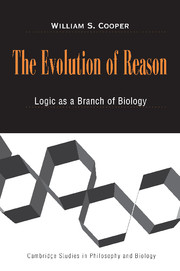Book contents
- Frontmatter
- Contents
- Foreword
- 1 The Biology of Logic
- 2 The Evolutionary Derivation of Life-History Strategy Theory
- 3 The Evolutionary Derivation of Decision Logic
- 4 The Evolutionary Derivation of Inductive Logic (Part I)
- 5 The Evolutionary Derivation of Deductive Logic
- 6 The Evolutionary Derivation of Inductive Logic (Part II)
- 7 The Evolutionary Derivation of Mathematics
- 8 Broadening the Evolutionary Foundation of Classical Logic
- 9 The Evolutionary Derivation of Nonclassical Logics
- 10 Radical Reductionism in Logic
- 11 Toward a Unified Science of Reason
- Appendix: Formal Theory
- References
- Index
1 - The Biology of Logic
Published online by Cambridge University Press: 18 December 2009
- Frontmatter
- Contents
- Foreword
- 1 The Biology of Logic
- 2 The Evolutionary Derivation of Life-History Strategy Theory
- 3 The Evolutionary Derivation of Decision Logic
- 4 The Evolutionary Derivation of Inductive Logic (Part I)
- 5 The Evolutionary Derivation of Deductive Logic
- 6 The Evolutionary Derivation of Inductive Logic (Part II)
- 7 The Evolutionary Derivation of Mathematics
- 8 Broadening the Evolutionary Foundation of Classical Logic
- 9 The Evolutionary Derivation of Nonclassical Logics
- 10 Radical Reductionism in Logic
- 11 Toward a Unified Science of Reason
- Appendix: Formal Theory
- References
- Index
Summary
In The Descent of Man Charles Darwin made some remarks about ‘Reason.’ They begin
Of all the faculties of the human mind, it will, I presume, be admitted that Reason stands at the summit. Only a few persons now dispute that animals possess some power of reasoning. Animals may constantly be seen to pause, deliberate, and resolve. It is a significant fact, that the more the habits of any particular animal are studied by a naturalist, the more he attributes to reason and the less to unlearnt instincts. … (Darwin 1871, p. 75)
The passage continues with an astute commentary on the evolution of Reason in humans and animals.
The discussion initiated by Darwin has continued to this day. It has grown into a sophisticated discourse of considerable fascination, drawing on several disciplines. It has delved into animal reasoning in general and human rationality in particular. I have no special quarrel with the details of this extensive literature, to which I have contributed. Nevertheless, regarding the whole, I cannot help suspecting that something akin to a Ptolemaic blunder has been made. The larger order of things has been misconceived.
The original Ptolemaic blunder was rectified by the Copernican revolution, an event that has long intrigued methodologists of science. Ptolemy had the heavenly bodies orbiting a still earth. Centuries later, Copernicus changed the course of astronomy by taking the sun to be the central stillness instead. At the time there were no new observational findings to prompt the change. It was a matter of interpreting the same empirical data from a radically different standpoint. A number of subtle explanatory economies combined to support the heliocentric model.
- Type
- Chapter
- Information
- The Evolution of ReasonLogic as a Branch of Biology, pp. 1 - 18Publisher: Cambridge University PressPrint publication year: 2001

